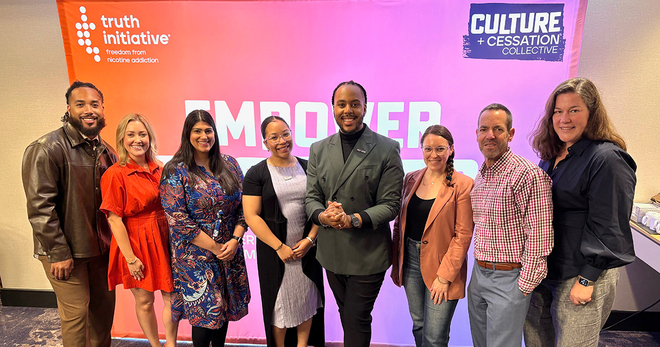Why local governments should take action on menthol cigarette sales
The evidence supporting a ban on menthol cigarettes is clear. The mint flavoring, which appeals to youth, makes cigarettes easier to smoke and harder to quit. Additionally, a federal ban already exists for all other flavored cigarettes.
The evidence is clear that menthol poses a threat to public health
Truth Initiative® has long called on the U.S. Food and Drug Administration to include menthol in the ban, and truth® is collecting signatures to petition the federal agency to do just that. In the meantime, state and local governments don’t have to wait for the FDA to act on menthol—and many aren’t. San Francisco became the first U.S. city to ban menthol sales earlier this year, Oakland followed with sales restrictions this month and several other localities are considering similar moves.
“Ideally, the FDA would issue a product standard to eliminate them,” writes Stacey Younger Gagosian, managing director of public policy at Truth Initiative and Joelle M. Lester, lead senior staff attorney for strategic initiatives with the Tobacco Control Legal Consortium, in their article “Finished with Menthol: An Evidence-Based Policy Option That Will Save Lives.” “However, since FDA has taken no action, states and municipalities can fill the void and move to protect their residents by instituting menthol sales restrictions.”
Drawing from Gagosian and Lester’s article, published this year in The Journal of Law, Medicine & Ethics, here’s why local governments should ban the sale of menthol tobacco products.
Menthol disproportionately affects certain groups and is slowing national progress on smoking
“The evidence is clear that menthol poses a threat to public health because menthol cigarettes increase the likelihood that youth and young adults will start smoking,” the authors write, adding that more than half of youth smokers smoke menthol cigarettes.
Young people and other groups, including African-Americans, Hispanics, the LGBT community, Asian-Americans and women, disproportionately smoke menthol cigarettes. The tobacco industry has long fueled these disparities by exploiting specific groups. For example, the industry strategically marketed menthol to appeal to the African-American community for decades, and today, nearly 90 percent of all African-American smokers use menthol cigarettes.
The result? While smoking rates have been decreasing, menthol is slowing the decline of cigarette smoking in the U.S. For example, data from 2004 to 2010 show that, while non-menthol cigarette use declined, menthol smoking rates remained constant and even grew among some groups.
“Menthol cigarettes are increasingly buoying smoking rates,” write Gagosian and Lester, adding that smoking remains the number one preventable cause of death and disease in the U.S., killing more than 540,000 people each year. “Without bold action, 5.6 million of youth today will die prematurely from smoking.”
State and local governments have the authority to ban menthol sales
While the Tobacco Control Act granted the FDA the authority to regulate tobacco products, the law also “preserves some state authority over tobacco products.”
The tobacco industry has argued that local authority does not include menthol sales restrictions because that amounts to a “product standard”—a rule regulating the design or safety of a product—which is the FDA’s domain. Tobacco companies have also argued that the FDA can’t ban specific classes of tobacco products, so neither can local governments.
According to Gagosian and Lester, neither of these industry arguments hold water. “The plain language of the Act and recent case law indicate these arguments will fail against well-crafted sales restrictions,” write the authors, noting that the industry has failed in court in New York City and Providence, R.I.
Given the impact of menthol cigarettes on public health and the authority of state and local governments to strengthen local tobacco control, communities have great potential to save lives. As Gagosian and Lester write: “We must take bold action now to eliminate menthol and move closer to ending the tobacco epidemic.”
More in tobacco prevention efforts
Want support quitting? Join EX Program
By clicking JOIN, you agree to the Terms, Text Message Terms and Privacy Policy.
Msg&Data rates may apply; msgs are automated.


